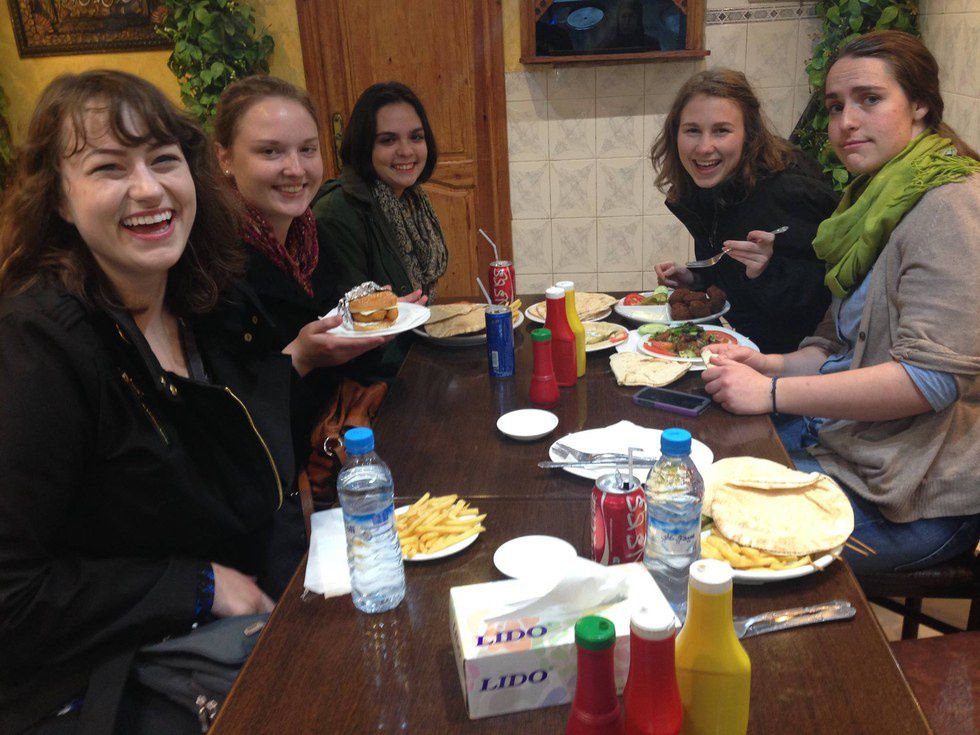Ah, study abroad. These two magical words have the ability to instantly transport any college student to the country of their dreams: Italy, Spain, England, France...Regardless of the location, studying abroad is imagined by many to be the perfect semester. This spring, I have been studying abroad in Meknes, Morocco. While I’ve enjoyed my time this semester, studying abroad hasn’t always been easy. From culture shock to homesickness to just getting lost, there are always unforeseen challenges that tend to be forgotten when you’re too busy dreaming about riding the London Eye or climbing to the top of the Eiffel Tower. Here are eight simple ways to help you make the most out of your study abroad experience and to bring back memories in addition to souvenirs.
1. Keep an open mind.
Above all else, keeping an open mind is key to a good study abroad experience. You're about to embark on an incredible adventure, and part of the ride is learning about new cultures and ways of life. You're going to meet a lot of people who think very differently than you, but don't let that stop you from appreciating their point of view. Similarly, not every aspect of the culture you're about to be immersed in will be exactly the same as your own culture. Being surprised by cultural differences is, of course, an acceptable reaction, but keeping an open mind will allow you to both appreciate the culture you're being immersed in and to question certain aspects of your own culture that you may take for granted.
2. Try new things.
Going along with number one, if you don't try at least one new thing every day while you're abroad, chances are you're doing it wrong. During my experience abroad, I've explored the Sahara by camel, explored the largest medina in the world, and climbed the second tallest mountain in Africa. As a result of these experiences, I have had the chance to see so much more of Morocco than I ever could have imagined. It's by going beyond your comfort zone that you get to know the real country, which more often than not is pretty amazing.
3. Learn about the country you're going to study in before you leave.
Although spontaneity can be great, research is key if you really want to understand and appreciate your study abroad country. On a practical note, certain traditions and customs unique to your study abroad country may need to be researched in advance. For example, here in Morocco, some more traditional families do not believe you should eat with the left hand. Knowing what to expect before you start traveling can save you embarrassment as well as giving you a foundation upon which you can build your understanding of the country.
4. Sometimes less really is more.
Packing right is a crucial part of studying abroad. Before you leave, you should look into both what and how much you should pack. If you're unsure of what to pack, packing lighter is always the better option. While you can almost always buy what you need abroad, packing too much could weigh you down and potentially cost you an extra fee if your bag is overweight.
5. Disconnect from technology so that you can reconnect with the outside world.
Being away from home is hard and it can be tempting to want to stay close to friends and family back home through social media. That being said, it's very difficult to immerse yourself in a culture when you're glued to your phone. Keeping in contact with everyone at home is important, but so is immersing yourself in your study abroad experience. Facebook and Twitter will always be there, but you'll only be in your study abroad country for a short time. Before you know it, your time abroad will be over and then you'll really want to be on social media all day...to look at all the pictures and videos of the amazing country (not to mention people) you just left.
6. Expect things to go wrong.
Any great adventure is bound to be marked by some stumbles. Whether you lose your train ticket, get lost, or get pick-pocketed, at some point, not everything will go as planned. Unfortunately, there's not always a quick fix for this kind of situations, but keeping a positive attitude and a level head can go a long way. Sometimes, getting lost can actually work in your favor. Some of my favorite memories here in Morocco come from being lost with friends and stumbling upon the most beautiful places.
7. Learn to say both "yes" and "no."
While it's important to be able to challenge yourself to say "yes" to challenging and rewarding situations, saying "no" to situations where you don't feel comfortable is just as important. Feeling out of your comfort zone is normal for a time, but if you feel truly uncomfortable or nervous you're always allowed to leave a situation. Everyone is different and has different boundaries, so don't worry if you might not enjoy a certain activity as much as others in your group. Instead, just focus on doing what you want to do.
8. Accept that you won't see everything.
As the final week of my program approaches, one of the hardest things for me about studying abroad has been not being able to cross off everything on my bucket list. While a semester may seem like a long time, a few months can go by much faster than you might think. Instead of focusing on what you didn't have time to do, focus on soaking in as much as you can. And at the end of the day, if you still have things you feel like you need to see in your study abroad country, you can always come back. The purpose of study abroad is to immerse you in a different culture, and if your immersion is truly complete then coming back to the country is only natural. Studying abroad shouldn't be an adventure, it should be the first step to an adventurous life.

























